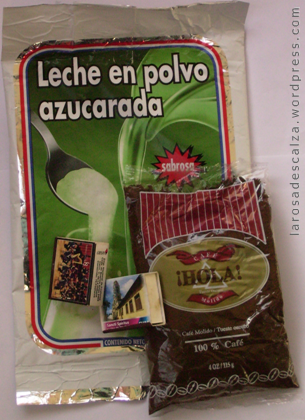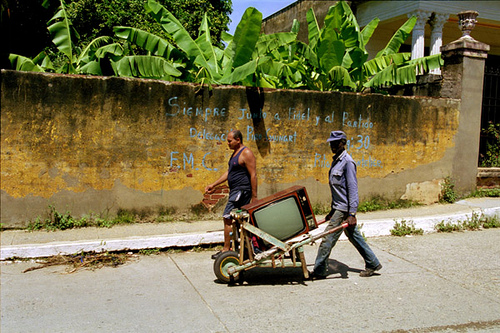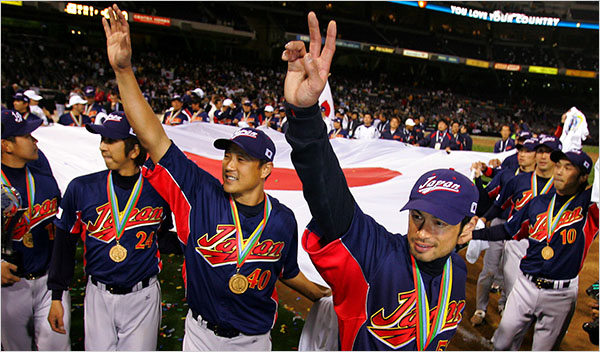
Recently, a friend and regular reader of our blog made a comment about a very controversial post in which he argued that the Mariel migration was triggered by the fact that “two Cubans launched a bus against an embassy in Havana.” In effect, that action was the public and visible event, but in any case, in my opinion, his approach, alluding to such a critical and controversial event in Cuba’s history in the last 50 years, tends to simplify an event marked by deep political connotations whose climax was the exodus of a quarter of a million Cubans.
That is why I decided to dedicate a special post to the subject, without attempting to exhaust the many complexities involved. It turns out that I was 20 by then, and these events marked a decisive turning point in my life, so they are sharply etched in my memory. The Mariel Boatlift was actually the last in a sequence of events that begun with talks between the Island’s government and a group of Cuban émigrés, agreements which took place during the Carter administration in the late 70’s, which led to the opening of travel for Cubans residing in the US to visit Cuba — popularly known as “Community Trips” — under which, relatives from either side of the Florida Straits could be reunited, after being long separated due to the politics of demonization which up to that point the Cuban government had maintained against the émigrés.
It is possible that some of my readers won’t agree with me, but I am willing to bet that when he accepted these discussions, F. Castro had underestimated their political cost. For the first time in 20 years the government was inconsistent, and those that until then had been “worms”, people without a country, pro-imperialists or traitors — epithets the revolutionaries used to describe the émigrés — were now returning as born-again, revalued and re-christened as “our brothers of the Cuban community abroad”, by the grace of a speech of the leader of the Revolution himself. Automatically, without the benefit of logic or explanation, maintaining relationships with family members who had left the country was no longer censured. Moreover, the re-encounter was blessed and we could jubilantly welcome them into our homes once again. Many began to discover that we had been scammed, and it became clear that the discredit towards emigration had been a clever manipulation of government policy.
Family ties that should be — and in fact, are — the most natural thing in the world, acquired for Cubans a special connotation due not only to the split between those who were leaving and those remaining in Cuba that had often marked irreconcilable antagonisms, but also because on this shore, for two decades, power had woven its ideological supremacy based on the rejection of certain values considered “decadent” and “representative of a dehumanized dead society” which were now returning under the guise of consumer goods brought as presents by the émigrés to their impoverished relatives on the Island. All of a sudden, Cubans here found out that their “northern” relatives, without communism, marches, voluntary work, without slogans or speeches, were more prosperous, better off, and had more possibilities for professional and personal success. The New Man, with his ugly khaki pants and stiff boots for the sugar cane fields, staggered first, and then fell before the charms of the consumer society. Jeans and sneakers, the greatest expressions of the “ideological diversionism” — a doctrine that hung like a guillotine over the head of any young person on the Island — were stronger than the Marxism-Leninism manuals that cluttered our heads in schools, and faith in the system underwent its first major fissure.
In 1980, the death of Cuban guard Pedro Ortiz Cabrera during the Peruvian Embassy events in Havana was the perfect excuse Fidel Castro needed. The incident occurred just when the government needed to create and nurture a situation at all costs that allowed it to self-retract, strengthen the patriotic discourse and fortify itself in the figure of confrontation against the external enemy. It became urgent to inject a strong dose of patriotism into the people, and for that, Carter’s conciliatory and friendly spirit had to be bombarded, mainly by creating an artificial crisis. It was urgent to offer the world an image of a Cuba perversely manipulated by the common enemy of all the peoples, which, with its siren’s song, encouraged delinquents and made the biggest softies, the ones “in hiding” and the false revolutionaries change their course. And so it was that, right after the event, guards at the embassy of Peru in Havana were withdrawn, which was broadcast intentionally through the media so that the “new worms” grouped under the epithet of “scum” (who shortly after would once again be “brothers of the community” and would come back to visit Cuba) could have access to the embassy grounds.
I don’t think even Castro himself was able to imagine the enormity of the masses that in just 72 hours swamped the Peruvian Embassy, let alone, when the Mariel-Miami route was opened, that the number of Cubans willing to emigrate would multiply exponentially. His surprise was translated into a furious indignation that seemed to have no limits. His speeches were more aggressive, bitter and angrier than ever before, only now it was directed against many who, until then, had been our dear friends, our neighbors of a lifetime or our fellow students, so the message lost its legitimacy. The revolutionary dream of a nurtured generation of youth born between the 1950’s and 60’s had broken. The age of innocence had ended and we would never be the same again.
Linked to the whole course of discussions-émigrés’ visits-events at the Embassy of Peru-Mariel exodus, were other associated phenomena, that happened simultaneously and affected the social psychology within Cuba, such as, for example, that which is known under the name Consciousness Study Process –- a purge that in 1980 expelled from the ranks of the Young Communist League and the Cuban Communist Party those who did not obey the requirements that communist model dictated, were suspected of “diversionism” or questioned the dogma; the shameful repudiation meetings, which publicly highlighted the essence of the fascist regime, and the so-called Combative People’s Marches, created to demonstrate the commitment of the people toward their government.
Castro assimilated the teachings of those events and managed to use them to his advantage: he broke the process of becoming close with a country that was more useful to him as his enemy, he opened an escape valve to relieve tensions within Cuba through the exodus of tens of thousands of Cubans, and he managed to reinforce terror in the population through the powerful repressive machinery disguised as “the angry people” trained to dole out beatings to the defenseless who dared to express the least displeasure or to even an intent to leave the country. Similarly, from abroad, it reinforced the support of the USSR and the socialist camp, and the Cuban government was able to improve the living conditions of the population, to some extent, with the creation that same year of the parallel market that widened significantly the supply of consumer goods and the emergence of non-state agricultural markets, which also elevated the food possibilities. The short years of false socialist prosperity were being born, just before the end of the Eastern Europe regime.
Apart from this account, I remind the reader friend who inspired these memories in me that the demonstrations of those years were never explicitly against the government, but in favor of emigration. It is true that a mass migration like the one that took place then is the most tangible expression of a peoples’ discontent in relation to their government, but none of those 200 thousand Cubans thought for a moment to concentrate all that critical mass in front of the Government Palace to demand the rights and opportunities they wished for, none shouted “down with the Castro dictatorship”. And there wasn’t — as there isn’t now — political or civic will in the Cuban people capable of changing the status quo. Such is our character, like it or not, which is why it is crucial to help create civic consciousness as soon as possible.
I agree that the current conditions in this country can cause any event, however insignificant it may seem, to trigger a popular revolt; I don’t know to what point it could become a massive uprising. We are approaching a real dead-end from which not even the government tricks could get us out of. Today, Cuba needs a miracle that I, in spite of everything, believe possible. I also hope that miracle occurs through peaceful means and that the new generations, free from the doctrines that slowed their ancestors (our parents and us), are the renewing power of a future Cuba. It is true that no one can predict when and how changes will occur, but if they are unleashed through feelings of hatred, revenge and violence, we would only aggravate the present and dangerously compromise our future as a nation.
Our dear reader can consider himself privileged in that he was able to experience an exceptional process in his country, since conditions were very different to ours — despite our cultural similarities marked by history — Francisco Franco, “Leader of Spain by the grace of God”, who failed to remove the republican sentiments in Spain despite the outcome of the bloody Civil War, died quietly his hospital bed, sickly and at a very old age, just as his Caribbean counterpart will surely die. The Spanish were lucky that Franco was not as long-lived as Castro. In Spain, unlike Cuba, at the time of the dictator’s disappearance, there were –- as always — owners, social classes with well-defined interests, opposition (including the Communists), civil society and an emblematic figure, Prince Juan Carlos — supported by Franco himself to counter the republican spirit — with enough intelligence and will to foster strong leadership to an agreed transition. All of this prevented a bloodbath.
Our situation is different. Politics in Cuba have historically been decided by a chosen few elite groups; Cuban people, by nature, have always rejected politics and have resigned themselves (settled for?) to having others carry it out for them. Since 1959, Castro took care to dispel any vestiges of citizenship and to crush any semblance of independent thought, annulled the economic capability of society and reduced individuals to the status of “mass.” He had on his side the proverbial political apathy of Cubans and a curiously infantile enthusiasm for leaders and revolts. It is thus that almost all popular manifestation of nonconformity in the past half a century have been reduced to escaping the country (let’s remember, for instance, the “Maleconazo” and the boat people crisis of 1994) and not to even ask for political reforms or changes. If only a few thousand Cuban felt their civic duty we would not have the dubious distinction of carrying on our shoulders and minds a half a century-old dictatorship. The end of the Cuban dictatorship is near, I don’t doubt that, but I am afraid that the new nation’s labor is going to be a slow and extremely painful one.
Translated by Norma Whiting
22 February 2011
![Imagen 007[1]](http://www.TranslatingCuba.com/images/Silvio/imagen-0071.jpg)







 While in Egypt hundreds of thousands of people decided the fate of their country by speaking out through strong and sustained public protests against a 30-year dictatorship, in a local Havana setting a dispute was being resolved by a diametrically opposite philosophy dictated by survival: the battle for the potato. The comments might seem like a joke, but they are about completely real facts that I was a witness to.
While in Egypt hundreds of thousands of people decided the fate of their country by speaking out through strong and sustained public protests against a 30-year dictatorship, in a local Havana setting a dispute was being resolved by a diametrically opposite philosophy dictated by survival: the battle for the potato. The comments might seem like a joke, but they are about completely real facts that I was a witness to.